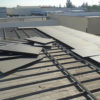Croda International has donated 1,000 SunPower solar panels to three non-profit organizations for use in low-income housing and crop generation.
Croda relocated its North American headquarters and Innovation Centre from Edison to Plainsboro in January 2020. The Edison facility was equipped with solar panels, which could not be utilized at the new Plainsboro site; therefore, Croda partnered with Decom Solar to donate the panels to three non-profit organizations.
Croda’s former facility in Edison was equipped with solar panels that could not be used at its new headquarters in Plainsboro. So, Croda partnered with Decom Solar to donate the panels to three non-profit organizations.
“Once we became aware the solar panels could not be utilized at our new site, finding organizations that could benefit from the panels long term was essential,” said David Shannon, president of consumer care at Croda.
Decom Solar provides decommissioning and repurposing services for end-of-life solar arrays. Working with non-profits and recycling partners, Decom Solar determines removal solutions for each client.
With the help of Decom Solar, Croda donated 1,000 305-W SunPower modules for a total of 305 kW of power and 1 Satcon Power Gate Plus 375 kW Central Inverter. These modules are estimated to still produce up to 335,843 Kilowatt hours per year.
The three organizations that received the solar modules are:
- The Jackson Resource Center, located in Jackson, Mississippi, raises funds and awareness for the local homeless population. The Jackson Resource Center is currently storing all the remaining modules prior to distribution.
- The Mileston Cooperative Association, set by the Farmers Security Administration in 1942, is located in Holmes County, Missouri. Mileston has a large-scale vegetable-growing operation that serves the community. The co-op is currently working on using the donated modules to power a hydroponics system.
- Kinead Housing Foundation is a non-profit housing group based out of Jackson, Mississippi, supporting and developing affordable low-income multifamily housing. Kinead is currently allocating panels for these homes.
News item from Croda






“Decom Solar provides decommissioning and repurposing services for end-of-life solar arrays. Working with non-profits and recycling partners, Decom Solar determines removal solutions for each client.”
This is what the industry as a whole needs, to grow the client base and make cheaper solar PV options available to communities in need. It appears that solar PV modules of just a few years ago have better specifications than the solar PV panels of past decades. There are some old solar PV modules still in service since the 1970’s and still meet the power output of the specification tag on the panel. Since mass manufacturing of solar PV is now the norm, it takes about 10 years to amortize a solar PV farm. This allows the utility to remove and repurpose the older solar PV farms and reuse the old solar PV panels for decades more use of these panels. As large solar PV projects are constructed, land will becoming at a premium for even remote solar PV farms on say 10,000 acres. In the future as in now, one could take an old project installed in 2003-6 and replace the panels, add single east/west tracking and add new technology solar PV panels and almost double the output of that solar PV farm. All of the removed panels still have a lot of life left in them for use elsewhere. Creating micro-grids for communities of need, public entities like boys and girls clubs, schools etc.. One can predict sooner or later that something like Perovskites will have their problems with moisture degradation solved and have a solar PV cell that is 30% efficient or a little more and older solar PV farms that are 10 years old or older would make a decision to upgrade their system output for more energy generation from the same site area.